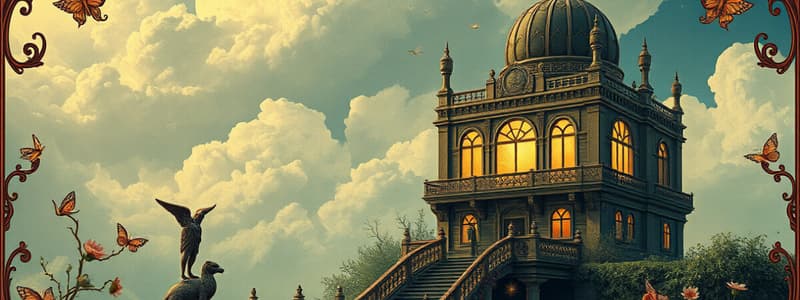Podcast
Questions and Answers
What does the term 'literature' etymologically derive from?
What does the term 'literature' etymologically derive from?
- Anecdotes and stories
- Writing formed with letters (correct)
- Oral traditions and spoken word
- Creative expressions and performances
Which type of dramatic work explores sorrowful or terrible events typically caused by a heroic individual?
Which type of dramatic work explores sorrowful or terrible events typically caused by a heroic individual?
- Comedy
- Farce
- Tragedy (correct)
- Dramatic Monologue
Which of the following best describes the nature of literature?
Which of the following best describes the nature of literature?
- Strictly verbal and poetic
- Focused primarily on fictional narratives
- Timelessness and universality (correct)
- Only appeals to emotions
What distinguishes dramatic poetry from other forms of poetry?
What distinguishes dramatic poetry from other forms of poetry?
Which of the following is NOT a type of comedy in dramatic poetry?
Which of the following is NOT a type of comedy in dramatic poetry?
What is characterized by incorporating graphic details like images, colors, and layout?
What is characterized by incorporating graphic details like images, colors, and layout?
What technique involves an indirect mention of another work or idea?
What technique involves an indirect mention of another work or idea?
Which of the following refers to a poet who used a unique rhyme scheme and is known for his literary critiques?
Which of the following refers to a poet who used a unique rhyme scheme and is known for his literary critiques?
Which point-of-view allows the reader to understand the feelings and thoughts of all characters?
Which point-of-view allows the reader to understand the feelings and thoughts of all characters?
What aspect of writing evokes emotions from the reader and defines the overall atmosphere?
What aspect of writing evokes emotions from the reader and defines the overall atmosphere?
What type of poetry combines haiku with painting, particularly in Japanese culture?
What type of poetry combines haiku with painting, particularly in Japanese culture?
Which characterization method involves describing a character through their actions and dialogue rather than via narration?
Which characterization method involves describing a character through their actions and dialogue rather than via narration?
What term refers to the emotion conveyed by the author's attitude towards the subject or audience?
What term refers to the emotion conveyed by the author's attitude towards the subject or audience?
What is the main purpose of a dramatic monologue in poetry?
What is the main purpose of a dramatic monologue in poetry?
Which of the following is the best description of farce?
Which of the following is the best description of farce?
What is a key characteristic of lyric poetry?
What is a key characteristic of lyric poetry?
Which form of poetry is structured to glorify a person or event?
Which form of poetry is structured to glorify a person or event?
What is metrical romance commonly referred to as?
What is metrical romance commonly referred to as?
Which of the following best describes an elegy?
Which of the following best describes an elegy?
What do the literary standards of suggestiveness refer to?
What do the literary standards of suggestiveness refer to?
What does a ballad primarily do?
What does a ballad primarily do?
What is a defining characteristic of a round character?
What is a defining characteristic of a round character?
Which type of conflict involves a struggle within a character's mind?
Which type of conflict involves a struggle within a character's mind?
Which element is NOT considered in the structure/form of a poem?
Which element is NOT considered in the structure/form of a poem?
What does the term 'theme' in literature typically refer to?
What does the term 'theme' in literature typically refer to?
Which of the following is an example of sound in poetry?
Which of the following is an example of sound in poetry?
Which of the following figures of speech implies a comparison?
Which of the following figures of speech implies a comparison?
What is the primary role of minor characters in a narrative?
What is the primary role of minor characters in a narrative?
Which of the following is NOT a type of conflict explored in narratives?
Which of the following is NOT a type of conflict explored in narratives?
Flashcards are hidden until you start studying
Study Notes
Definition and Nature of Literature
- Originates from the Latin words "litera" (letters) and "litteratura" (writing).
- Appeals to emotional, intellectual, spiritual, and creative needs of individuals.
- Represents a harmonious expression of human experiences.
Functions of Literature
- Provides entertainment and cultural insights.
- Acts as a medium for social and political commentary.
- Conveys ideological and moral messages.
- Serves educational purposes and enhances linguistic skills.
Literary Standards
- Universality: Themes resonate across different cultures and times.
- Permanence: Works endure over time due to their significance.
- Intellectual, Spiritual, and Artistic Value: Encourages deep thinking and emotional engagement.
- Suggestiveness: Captures complex ideas and evokes imagination.
Dramatic Poetry
- Designed to be spoken and performed on stage.
- Types include:
- Comedy: Amusing tone with cheerful conclusions.
- Tragedy: Explores serious themes and humanity's role.
- Dramatic Monologue: A character reveals personal insights to the audience.
- Farce: Uses absurdity for comedic effect.
Lyric Poetry
- Short poems expressing strong emotions and thoughts.
- Types include:
- Ode: Celebrates an individual or concept.
- Elegy: Reflects on loss or death.
- Sonnet: A structured, 14-line poem in Iambic Pentameter.
- Idyll/Pastoral: Captures rural life and simplicity.
Elements of Fiction
- Characterization:
- Direct: Author explicitly describes characters.
- Indirect: Hints at character traits through actions and dialogue.
- Characters may be round and dynamic, flat and static, or minor roles affected by conflicts.
- Conflict:
- Internal: Struggles within a character.
- Interpersonal: Conflicts between characters.
- External: Struggles against outside forces.
Plot
- Can be linear, non-linear, or utilize cliff-hangers.
- Plot devices include:
- Flashbacks: Revealing past events.
- Foreshadowing: Hinting at future events.
- Suspense: Maintaining tension.
- Allusion: Indirect references to other texts or events.
Point of View and Mood
- Point of View:
- First Person: Narrator is a character in the story.
- Third Person: Narrator is outside the story, either omniscient or limited.
- Mood: The emotional atmosphere created for the reader, such as melancholy or anger.
Tone and Themes
- Tone: The author's attitude expressed through word choices (formal, informal, serious, humorous).
- Themes convey underlying messages, often subliminal.
Elements of Poetry
- Sense: Involves diction, imagery, and figures of speech like simile, metaphor, and personification.
- Structure/Form: Organization of content including stanza arrangement.
- Sound: Incorporates tone, rhythm, meter, and rhyme schemes.
Unique Poetry Forms
- Visual Poetry: Combines textual and graphic elements.
- Haiga: Merging of haiku and painting.
- Insta Poetry: Emerged with social media, focusing on emotional aesthetics.
Notable Poet
- Jose Garcia Villa: Filipino poet known for innovative styles such as the "reverse consonance" rhyme scheme and "comma poet" techniques.
Studying That Suits You
Use AI to generate personalized quizzes and flashcards to suit your learning preferences.




